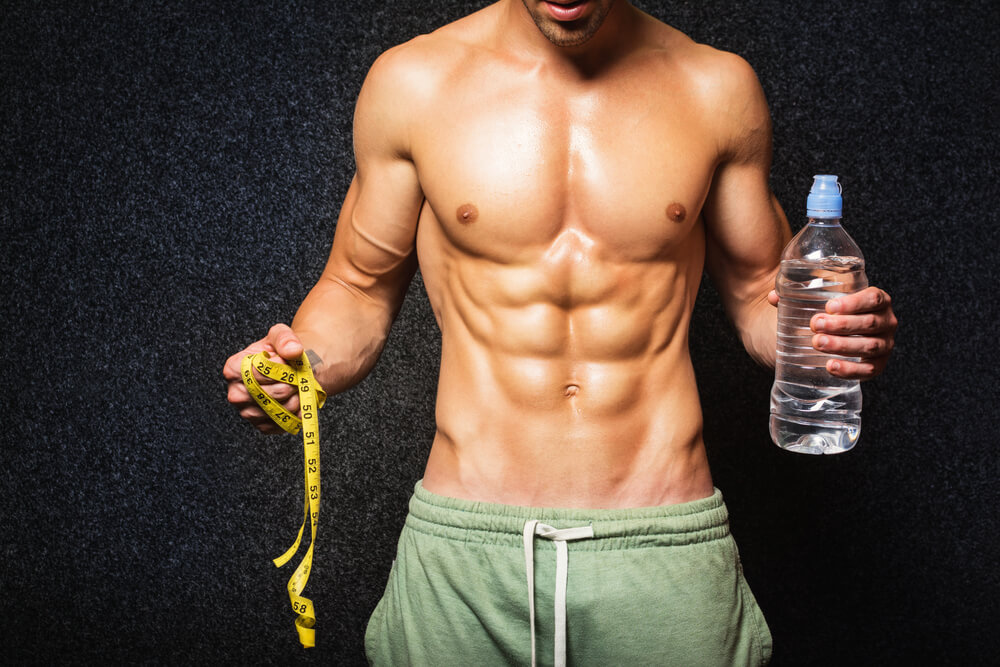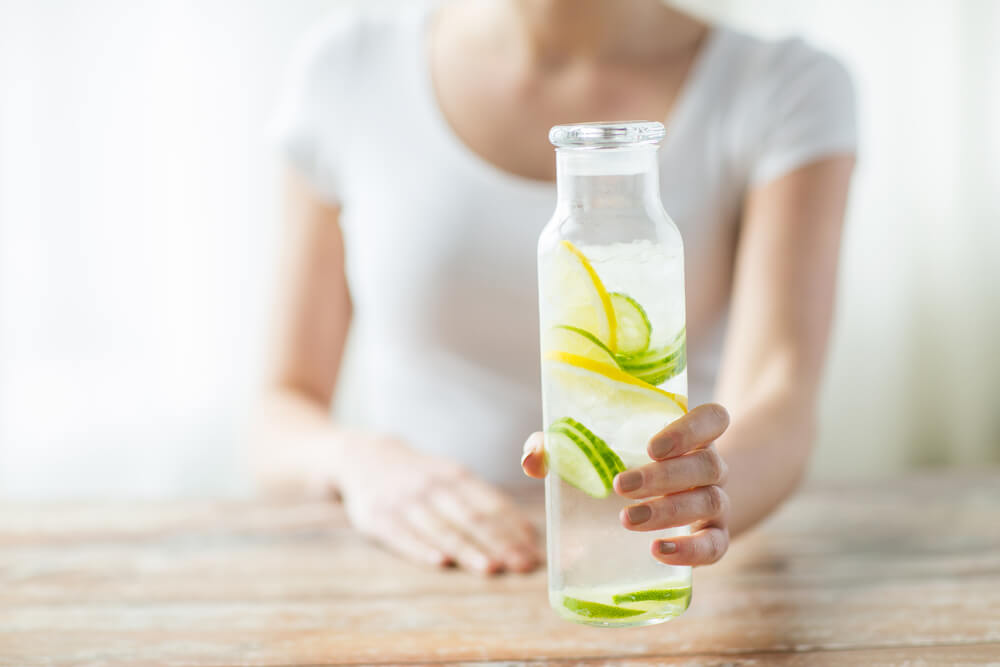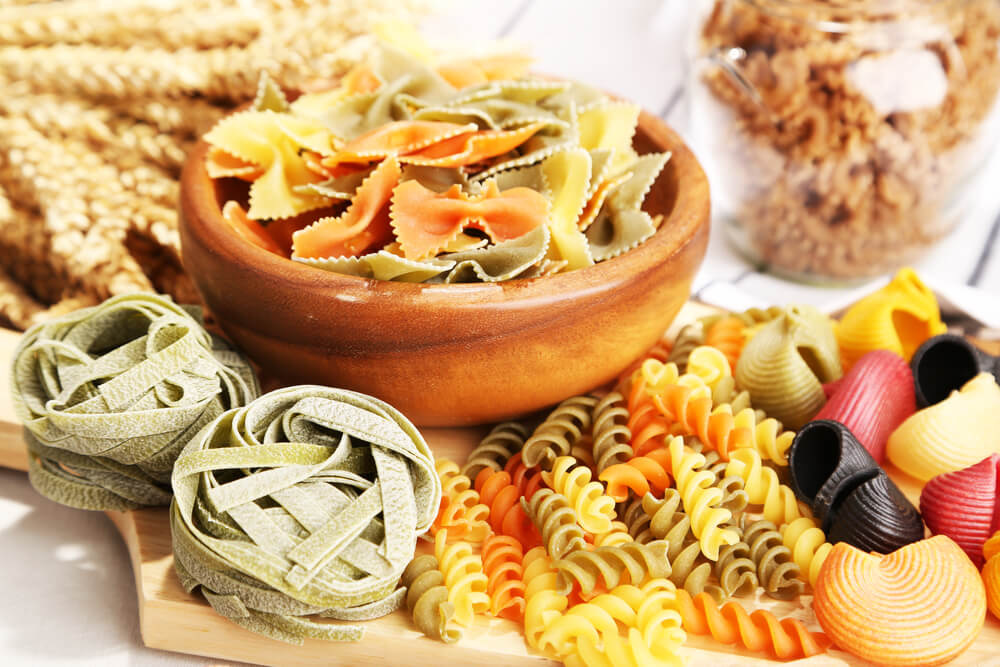
Have you ever talked to someone who simply raved at how much weight they lost during the first few days of a diet? They list off a number that’s almost unbelievable, but it’s hard to deny results. They tell you over and over you absolutely need to jump on board with the diet they’ve done, because after all, wouldn’t you love to shred through 10 or more pounds in less than a week. If you could keep those kinds of numbers up you would have no problems at all getting your beach body.
However, the next time you see your friend and you ask them about their weight loss they’ll probably tell you they haven’t seen the continual numbers like they had during earlier weeks and they are not sure what happened. They’re still following the same dietary requirements and exercising the same amount.
Well, you don’t have to guess what is happening.
They experienced a massive loss of weight early on because they shed water weight. Water weight is easy to cut. And while it doesn’t represent you losing any kind of fat weight, it is helpful if you’re trying to reach a certain weight or drop a few pounds to fit into an outfit. So if you’re interested in dropping weight that is only temporary in your body, here is what you need to know about water weight loss.
What’s the Secret to Water Weight Loss
Water Retention Via Sodium

Your body retains water based on what you eat and how much water you drink.
If you do not drink enough water (at least eight glasses of 8-ounces of water per day) your body will retain water. This is because your body is detecting you’re not bringing in much water, and in an effort to keep you hydrated it retains water. So while it might sound counterproductive, if you want to strip water weight you’ll actually need to increase the amount of water you consume.
Beyond this though your diet heavily impacts how much water you retain. You can specifically identify this by looking at your sodium and carbohydrate intake. The more salt you regularly eat the more water you will retain.
While high levels of sodium can vary from one person to the next, Queen Mary University of London, in conjunction with Wolfson Institute of Preventive Medicine reports your body will retain around 1.5 liters of water when it becomes accustomed to high levels of sodium in the body.
According to the CDC’s 2015-2020 Dietary Guidelines for Americans, the recommended sodium per day intake to be no more than 2,300 milligrams.
However, the same study also found the average American consumed around 3,400 milligrams every day. In addition to causing the body to retain water, the continued overconsumption of sodium increases a person’s chance of developing medical problems such as high blood pressure, stroke, and heart disease.
So, ideally, you will do everything in your power to keep your sodium levels to under 2,300 mg. The best way to determine what you’re consuming is to keep a food journal and, while you’re doing this, look at the amount of sodium in the foods you’re consuming.
Even if you take a snapshot of what you’re eating for just a few days you should have a better understanding of what kind of sodium you’re bringing in.
And don’t forget to count the sauces and any salt you sprinkle over food. It’s easy to take what would be a healthy diet and exponentially increase the sodium levels just by what you add to the food you’re consuming.
Water Retained Per Carb
Carbohydrates offer your body instant energy.
This is because carbs are broken down by the body almost instantly. By the time a carbohydrate has reached your stomach a good portion of it has already been broken down and absorbed into the bloodstream. Proteins take longer to be broken down, and fats cannot be broken down without stomach acid.
Because carbs are used for energy almost instantly it is important to use up the calories consumed through carbohydrates. If you don’t the consumed carbs will be converted into stored energy (fat).
The carbs that are not initially used as energy will be processed in the body. These carbs will also retain a considerable amount of water. Depending on your body, every carbohydrate gram will retain two to three grams of water (Huffington Post, 2015).
Let’s say you went to McDonald’s on the way home from work, grabbed a Big Mac, large fry, and large Coke (we’re not picking on McDonald’s, we’re just using it as an example because it is the most popular fast-food chain). Well, a Big Mac (without bacon) comes packed with 46 grams of carbs. A large Coca Cola Classic has 80 grams of carbs. A large order of French fries contains 66 grams of carbs (according to Fast Food Nutrition).
Total all of this up and you have 192 grams of carbs. And if your body retained three grams of water per gram of carbohydrates, your body will retain 576 grams of water. There is about 454 grams per pound.
In other words, your body will instantly put on over one pound from eating that meal, and that’s just from the water you retain from carbs within the food. That doesn’t even include the calories you consumed or the water your body retains from other materials within the food.
And if you ate in the restaurant and had a refill of Coke?
You could quickly approach two pounds of water retention, just from one meal. This also doesn’t even take into consideration the amount of sodium found in fast food (its a lot).
All things considered, it wouldn’t be out of the ordinary for your body to weight five pounds more than you did the day before, all because you stopped off for a quick fast food meal.
When you think about it the kind of water your body retains from these foods is startling.
And yet, it also means you can quickly and effectively drop a considerable amount of weight, all without switching to some crazy diet.
By simply cutting out most of your sodium and either limited your carbs, or only consuming carbs before working out (or another athletic activity) you’ll see rapid weight loss thanks to the water you’re pushing out of your system.
How To Shed That Water Weight

As you can see, your body wants to retain water. If you eat salt your body will retain water. If you eat carbs, especially a carb-rich diet, your body will retain water. If you don’t drink enough water your body will go ahead and retain it. All of this is going to lead to weight gain through water weight. Thankfully it doesn’t take much to shed this water weight.
To start, focus in on ridding your body from the excess salt. It doesn’t need it. In fact, your body will feel much better off if you ditch the salt. With the food journal at your disposal, you’ll be able to monitor what you eat for a week or so and see exactly how much salt you consume.
When you remove most salt from your diet you will notice the difference initially and you’ll want to reach for the salt. It’s natural.
Your body becomes accustomed to all the sodium. So when the food is lacking salt it may end up tasting flavorless. Well, let this removal of salt open up new flavor possibilities. Experiment with different spices. It can be a fun time in the kitchen as you remove salt and replace it with something else.
If you really need the salt, consider using Himalayan pink salt. This salt doesn’t have as much sodium and there are a number of health benefits to the pink salt. It is a common ingredient in ancient medicines as well. However, there are other options as well. You can opt for spices like chives, chili or cayenne powder, rosemary, or other seasonings that will help you achieve a different take on food.
According to the Food Insights Organization, some of the best seasonings and tastes to replace salt with include peppercorns (aka freshly grown black pepper, which has both fiber and calcium inside of it), lemon juice, cumin, a balsamic vinegar, and cayenne pepper.
As for the carbs you’ll first want to make sure you’re not overdoing it. Avoid simple carbs (found in potatoes, white rice, white bread, white pasta, and sugar), and instead opt for complex carbs such as brown rice, 100% whole wheat bread, whole-wheat pasta, and other unprocessed grains.
And if you want to completely strip your body of carbs you’ll want to opt into a low calorie, lean protein meal. Meals including fresh greens, grilled chicken, fish, and other seafood (that isn’t fried), will help you shed the water weight.
Drink Your Water

Speaking of shedding your water weight, you absolutely need to focus on what you’re drinking. When looking back at that McDonald’s meal, it was the Coca-Cola that had more carbohydrates in it than either the burger or the fries. Sweetened beverages are loaded with carbs and will lead you to retain water.
That is why you need to remove all sweetened beverages from your diet, including soft drinks, juices, and coffee that has been sweetened with sugar. If you still need your caffeine intake for the day (who can blame you) but you don’t like black coffee, consider adding cinnamon. Cinnamon doesn’t have the kind of calorie or carb count as sugar, and it also helps boost your metabolic rate. This makes it a win-win as a sugar replacement for your coffee (News Medical Network, 2019).
You should focus on drinking at least 64 ounces of water per day.
If you’re really trying to force water weight out you need to exceed this. The more water you bring in the more water you’ll push out and the less it retains. If you struggle drinking water during the day try to grab a few 32-ounce containers of water. Then keep it at your desk and sip at it throughout the day. If you do this you’ll find it’s that much easier to drink your share of water.
Exercise
One way to really help expedite the process of shedding water weight is to exercise. Working out will help push more water out of your body. You will also sweat out salt, which helps push out some of the sodium you have in the body. You will need to stay hydrated and increase the amount of water you drink, otherwise, your body will latch on to whatever moisture you have.
There is no specific kind of workout that is better than others. Basically you want to increase your heart rate and force your body to sweat. Hot yoga can help with this. If you know anyone who does hot yoga they probably swear by it. Hot yoga does help open up your muscles and force your body to sweat. You can also invest in a body sweatsuit.
These are bag-like suits that you wear that prevents your moisture from escaping into the atmosphere. Basically it turns the area around your skin to an extremely humid environment, which causes your body to sweat even further.
Don’t want to invest in a sweatsuit?
Not a problem. You can use a thick, heavy-duty, black trash bag for your body. You’ll be amazed at how much you sweat when wearing one of these while working out.
In Conclusion
Your body retains water. As it is made up of more water than anything else it needs a considerable amount of water to remain healthy.
However, you can force it to not retain as much water by simply adjusting what you eat and drink. So, if you’re interested in dropping several pounds, either to help you see your abs, for an upcoming vacation or because you need to make a set weight for an upcoming competition, all you need to do is follow these tips and suggestions regarding water weight loss.
-Terry Asher
Terry Asher
Latest posts by Terry Asher (see all)
- Better Family – Product Review Liquid Daily 2 oz - Dec 16, 2024
- Post-Workout Recovery: The Key to Optimal Performance - Nov 25, 2024
- Pre-Workout Supplements – Everything You Need To Know - Nov 18, 2024












[…] Source link […]
[…] Gym Junkies […]
[…] Read The Entire Article By Terry Asher Here. […]
[…] it is best to stick with Himalayan pink salt as it is better for your body. You will want to drink this water on an empty stomach as well. If you don’t, the food you’re digesting will likely absorb most of […]
[…] diet in the first week might help you drop five or even 10 pounds, although most of this will be shedding water. In terms of shedding actual fat, it does take a little longer in order to do it […]
[…] diet in the first week might help you drop five or even 10 pounds, although most of this will be shedding water. In terms of shedding actual fat, it does take a little longer in order to do it […]
[…] diet in the first week might help you drop five or even 10 pounds, although most of this will be shedding water. In terms of shedding actual fat, it does take a little longer in order to do it […]
[…] you want a more effective result, add a little ice to your water. When you drink cold water, your body works extra hard to level the water temperature with your body temperature. Hence, […]
[…] of the top health tips for college students is to stay hydrated at all times. For some students, drinking water it doesn’t seem very beneficial, but it has some of the best benefits you can’t imagine. For […]
[…] suggestions for school college students is to remain hydrated always. To some college students, drinking water doesn’t appear very helpful, nevertheless it has among the greatest advantages that you […]
[…] of the primary health tips for college students is to stay hydrated at all times. To some students, drinking water does not seem very beneficial, but it has some of the best benefits that you cannot imagine. For […]
[…] of the primary health tips for college students is to stay hydrated at all times. To some students, drinking water does not seem very beneficial, but it has some of the best benefits that you cannot imagine. For […]
[…] of the primary health tips for college students is to stay hydrated at all times. To some students, drinking water does not seem very beneficial, but it has some of the best benefits that you cannot imagine. For […]
[…] of the primary health tips for college students is to stay hydrated at all times. To some students, drinking water does not seem very beneficial, but it has some of the best benefits that you cannot imagine. For […]